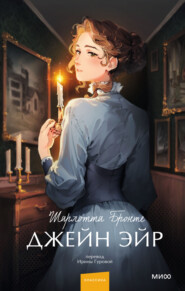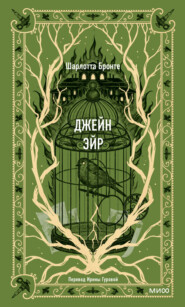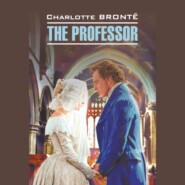По всем вопросам обращайтесь на: info@litportal.ru
(©) 2003-2024.
✖
Shirley
Настройки чтения
Размер шрифта
Высота строк
Поля
“Is change necessary to happiness?”
“Yes.”
“Is it synonymous with it?”
“I don’t know; but I feel monotony and death to be almost the same.”
Here Jessie spoke.
“Isn’t she mad?” she asked.
“But, Rose,” pursued Caroline, “I fear a wanderer’s life, for me at least, would end like that tale you are reading – in disappointment, vanity, and vexation of spirit.”
“Does The Italian so end?”
“I thought so when I read it.”
“Better to try all things and find all empty than to try nothing and leave your life a blank. To do this is to commit the sin of him who buried his talent in a napkin – despicable sluggard!”
“Rose,” observed Mrs. Yorke, “solid satisfaction is only to be realized by doing one’s duty.”
“Right, mother! And if my Master has given me ten talents, my duty is to trade with them, and make them ten talents more. Not in the dust of household drawers shall the coin be interred. I will not deposit it in a broken-spouted teapot, and shut it up in a china closet among tea things. I will not commit it to your worktable to be smothered in piles of woollen hose. I will not prison it in the linen press to find shrouds among the sheets. And least of all, mother” (she got up from the floor)—“least of all will I hide it in a tureen of cold potatoes, to be ranged with bread, butter, pastry, and ham on the shelves of the larder.”
She stopped, then went on, “Mother, the Lord who gave each of us our talents will come home someday, and will demand from all an account. The teapot, the old stocking-foot, the linen rag, the willow-pattern tureen will yield up their barren deposit in many a house. Suffer your daughters, at least, to put their money to the exchangers, that they may be enabled at the Master’s coming to pay Him His own with usury.”
“Rose, did you bring your sampler with you, as I told you?”
“Yes, mother.”
“Sit down, and do a line of marking.”
Rose sat down promptly, and wrought according to orders. After a busy pause of ten minutes, her mother asked, “Do you think yourself oppressed now – a victim?”
“No, mother.”
“Yet, as far as I understood your tirade, it was a protest against all womanly and domestic employment.”
“You misunderstood it, mother. I should be sorry not to learn to sew. You do right to teach me, and to make me work.”
“Even to the mending of your brothers’ stockings and the making of sheets?”
“Yes.”
“Where is the use of ranting and spouting about it, then?”
“Am I to do nothing but that? I will do that, and then I will do more. Now, mother, I have said my say. I am twelve years old at present, and not till I am sixteen will I speak again about talents. For four years I bind myself an industrious apprentice to all you can teach me.”
“You see what my daughters are, Miss Helstone,” observed Mrs. Yorke; “how precociously wise in their own conceits! ‘I would rather this, I prefer that’—such is Jessie’s cuckoo song; while Rose utters the bolder cry, ‘I will, and I will not!’”
“I render a reason, mother; besides, if my cry is bold, it is only heard once in a twelvemonth. About each birthday the spirit moves me to deliver one oracle respecting my own instruction and management. I utter it and leave it; it is for you, mother, to listen or not.”
“I would advise all young ladies,” pursued Mrs. Yorke, “to study the characters of such children as they chance to meet with before they marry and have any of their own to consider well how they would like the responsibility of guiding the careless, the labour of persuading the stubborn, the constant burden and task of training the best.”
“But with love it need not be so very difficult,” interposed Caroline. “Mothers love their children most dearly – almost better than they love themselves.”
“Fine talk! very sentimental! There is the rough, practical part of life yet to come for you, young miss.”
“But, Mrs. Yorke, if I take a little baby into my arms – any poor woman’s infant, for instance – I feel that I love that helpless thing quite peculiarly, though I am not its mother. I could do almost anything for it willingly, if it were delivered over entirely to my care – if it were quite dependent on me.”
“You feel! Yes, yes! I dare say, now. You are led a great deal by your feelings, and you think yourself a very sensitive personage, no doubt. Are you aware that, with all these romantic ideas, you have managed to train your features into an habitually lackadaisical expression, better suited to a novel-heroine than to a woman who is to make her way in the real world by dint of common sense?”
“No; I am not at all aware of that, Mrs. Yorke.”
“Look in the glass just behind you. Compare the face you see there with that of any early-rising, hard-working milkmaid.”
“My face is a pale one, but it is not sentimental; and most milkmaids, however red and robust they may be, are more stupid and less practically fitted to make their way in the world than I am. I think more, and more correctly, than milkmaids in general do; consequently, where they would often, for want of reflection, act weakly, I, by dint of reflection, should act judiciously.”
“Oh no! you would be influenced by your feelings; you would be guided by impulse.”
“Of course I should often be influenced by my feelings. They were given me to that end. Whom my feelings teach me to love I must and shall love; and I hope, if ever I have a husband and children, my feelings will induce me to love them. I hope, in that case, all my impulses will be strong in compelling me to love.”
Caroline had a pleasure in saying this with emphasis; she had a pleasure in daring to say it in Mrs. Yorke’s presence. She did not care what unjust sarcasm might be hurled at her in reply. She flushed, not with anger but excitement, when the ungenial matron answered coolly, “Don’t waste your dramatic effects. That was well said – it was quite fine; but it is lost on two women – an old wife and an old maid. There should have been a disengaged gentleman present. – Is Mr. Robert nowhere hid behind the curtains, do you think, Miss Moore?”
Hortense, who during the chief part of the conversation had been in the kitchen superintending the preparations for tea, did not yet quite comprehend the drift of the discourse. She answered, with a puzzled air, that Robert was at Whinbury. Mrs. Yorke laughed her own peculiar short laugh.
“Straightforward Miss Moore!” said she patronizingly. “It is like you to understand my question so literally and answer it so simply. Your mind comprehends nothing of intrigue. Strange things might go on around you without your being the wiser; you are not of the class the world calls sharp-witted.”
These equivocal compliments did not seem to please Hortense. She drew herself up, puckered her black eyebrows, but still looked puzzled.
“I have ever been noted for sagacity and discernment from childhood,” she returned; for, indeed, on the possession of these qualities she peculiarly piqued herself.
“You never plotted to win a husband, I’ll be bound,” pursued Mrs. Yorke; “and you have not the benefit of previous experience to aid you in discovering when others plot.”
Caroline felt this kind language where the benevolent speaker intended she should feel it – in her very heart. She could not even parry the shafts; she was defenceless for the present. To answer would have been to avow that the cap fitted. Mrs. Yorke, looking at her as she sat with troubled, downcast eyes, and cheek burning painfully, and figure expressing in its bent attitude and unconscious tremor all the humiliation and chagrin she experienced, felt the sufferer was fair game. The strange woman had a natural antipathy to a shrinking, sensitive character – a nervous temperament; nor was a pretty, delicate, and youthful face a passport to her affections. It was seldom she met with all these obnoxious qualities combined in one individual; still more seldom she found that individual at her mercy, under circumstances in which she could crush her well. She happened this afternoon to be specially bilious and morose – as much disposed to gore as any vicious “mother of the herd.” Lowering her large head she made a new charge.
“Your cousin Hortense is an excellent sister, Miss Helstone. Such ladies as come to try their life’s luck here at Hollow’s Cottage may, by a very little clever female artifice, cajole the mistress of the house, and have the game all in their own hands. You are fond of your cousin’s society, I dare say, miss?”
“Of which cousin’s?”
“Oh, of the lady’s, of course.”
“Hortense is, and always has been, most kind to me.”
“Every sister with an eligible single brother is considered most kind by her spinster friends.”
“Mrs. Yorke,” said Caroline, lifting her eyes slowly, their blue orbs at the same time clearing from trouble, and shining steady and full, while the glow of shame left her cheek, and its hue turned pale and settled—“Mrs. Yorke, may I ask what you mean?”
“To give you a lesson on the cultivation of rectitude, to disgust you with craft and false sentiment.”

















